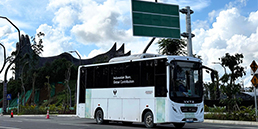04 Sep 2025

Why Commercial EVs are no longer a choice, but a necessity
In the face of a worsening climate emergency, the Asia-Pacific region stands at the center of the global emissions crisis. Responsible for over 55% of global greenhouse gas emissions, this region, home to some of the fastest-growing economies, must take urgent steps to curb its carbon footprint. Indonesia, Southeast Asia’s largest economy, plays a pivotal role in this challenge.
A key driver of these emissions is the transportation sector, which contributes to over 73% of global energy-related greenhouse gas emissions, making it one of the most critical sectors to decarbonize. Without a fundamental shift, remaining within the 1.5°C global temperature threshold will remain out of reach.
Indonesia’s vehicle market is booming, but nearly all of it still runs on fossil fuels. Electrification of commercial fleets such as trucks and buses is particularly low, with figures below 0.2%. Meanwhile, the road transport sector remains the single largest contributor to transportation emissions, both globally and domestically.
At the same time, Indonesia has set forth bold climate and industrial targets. The government aims to electrify 90% of public transport by 2030, achieve full urban transport electrification by 2040, and reach complete electrification of public transportation by 2045. The vision also includes domestic production of 600,000 electric vehicles annually by 2030. While these targets show promise, it demands coordinated execution, infrastructure development, and private sector innovation on a national scale.
Yet despite the urgency, electric vehicle (EV) adoption in Indonesia remains drastically low. Out of nearly 170 million registered vehicles, fewer than 300,000 are electric. The national EV penetration rate hovers at a mere 0.18%, highlighting the significant gap between environmental ambition and real-world implementation.
VKTR as an Accelerator of National Electrification
To support Indonesia’s ambitious shift to electric mobility, PT VKTR Teknologi Mobilitas Tbk. (VKTR) was established as an integrated EV company with capabilities ranging from local assembly, body manufacturing, distribution, aftersales service, and charging infrastructure. These core operations are strengthened by vehicle leasing mobility-as-a-service (MaaS) business model, a research & development (R&D) centre, and component manufacturing through Bakrie Autoparts, enabling VKTR to deliver end-to-end solutions that support a scalable and sustainable EV ecosystem.
At the heart of VKTR’s industrial footprint is our subsidiary, PT VKTR Sakti Industries (VKTS), located in Magelang, Central Java, Indonesia, with a facility designed to produce up to 3000 buses and trucks annually through the creation of 100 Green Jobs. As Indonesia's first Completely Knocked Down (CKD) commercial EV facility to meet the 40% local content (TKDN) requirement, VKTS reflects VKTR’s commitment to building a scalable, locally rooted EV ecosystem that generates jobs, strengthens national industry, and supports long-term sustainability.
The Road Ahead
Indonesia has the potential to become a global leader in electric mobility, but this future must be built, not inherited. As the country embarks on an ambitious journey to decarbonize its transport sector, the need for scalable, integrated, and locally driven solutions has never been greater. As our slogan goes “Membangun Negeri Tanpa Emisi” or “Paving the Way Toward an Emission-Free Nation”, we aim not just to be part of this transition, but lead the transition into a cleaner, more sustainable Indonesia, one electric vehicle at a time.
For media inquiries, please contact:
VKTR Corporate Communications
media.relations@vktr.id



